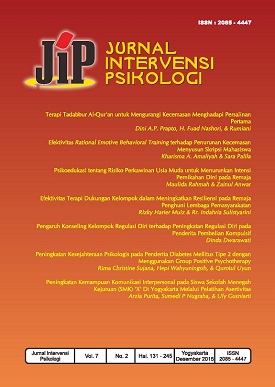Main Article Content
Abstract
Various reasons for a person doing early marriage, one of which is a condition where a person who has a strong desire to be married at a young age or who can be called with the intention. Intentions early marriage is the tendency of a marriage that has the desire to get married at the age of adolescence or under the age of 20 years. Increased intentions early marriage can be resolved, either by providing psychoeducation. The purpose of this study was to investigate the effect of psychoeducation early marriage in reducing early marriage intentions in adolescents in South Borneo. The research subjects were followed psychoeducation by category amounted to 55 people. This study is a quasi experimental study (quasi) also called quasi-experiment which is resembling (similar). This research uses a method of pre-experimental design with a kind of pre-test and post-test one group design. This method is given to one group without a comparison group. The results showed there were significant differences in scores on treatment without psychoeducation and with the treatment given psychoeducation t (-39,305; p = 0.000 <0.05). Thus, we can conclude that psychoeducation may be used to reduce early marriage intentions.
Keywords: Psychoeducation, intentions early marriage, teenage
Article Details
Authors who publish with this journal agree to the following terms:
- Authors retain copyright and grant the journal right of first publication with the work simultaneously licensed under a Creative Commons Attribution-ShareAlike 4.0 International License that allows others to share the work with an acknowledgment of the work's authorship and initial publication in this journal.
- Authors are able to enter into separate, additional contractual arrangements for the non-exclusive distribution of the journal's published version of the work (e.g., post it to an institutional repository or publish it in a book), with an acknowledgment of its initial publication in this journal.
- Authors are permitted and encouraged to post their work online (e.g., in institutional repositories or on their website) prior to and during the submission process, as it can lead to productive exchanges, as well as earlier and greater citation of published work (See The Effect of Open Access).





